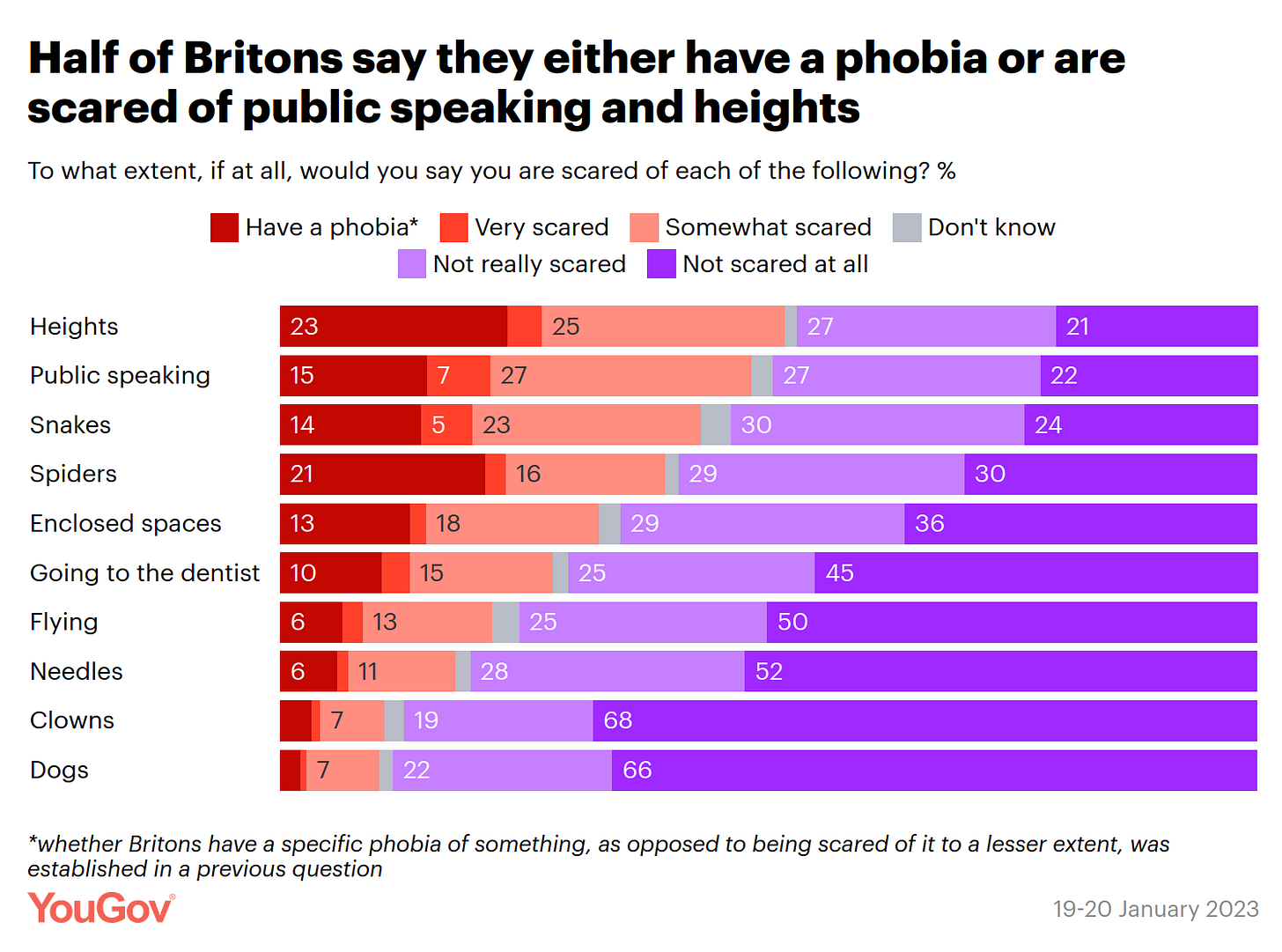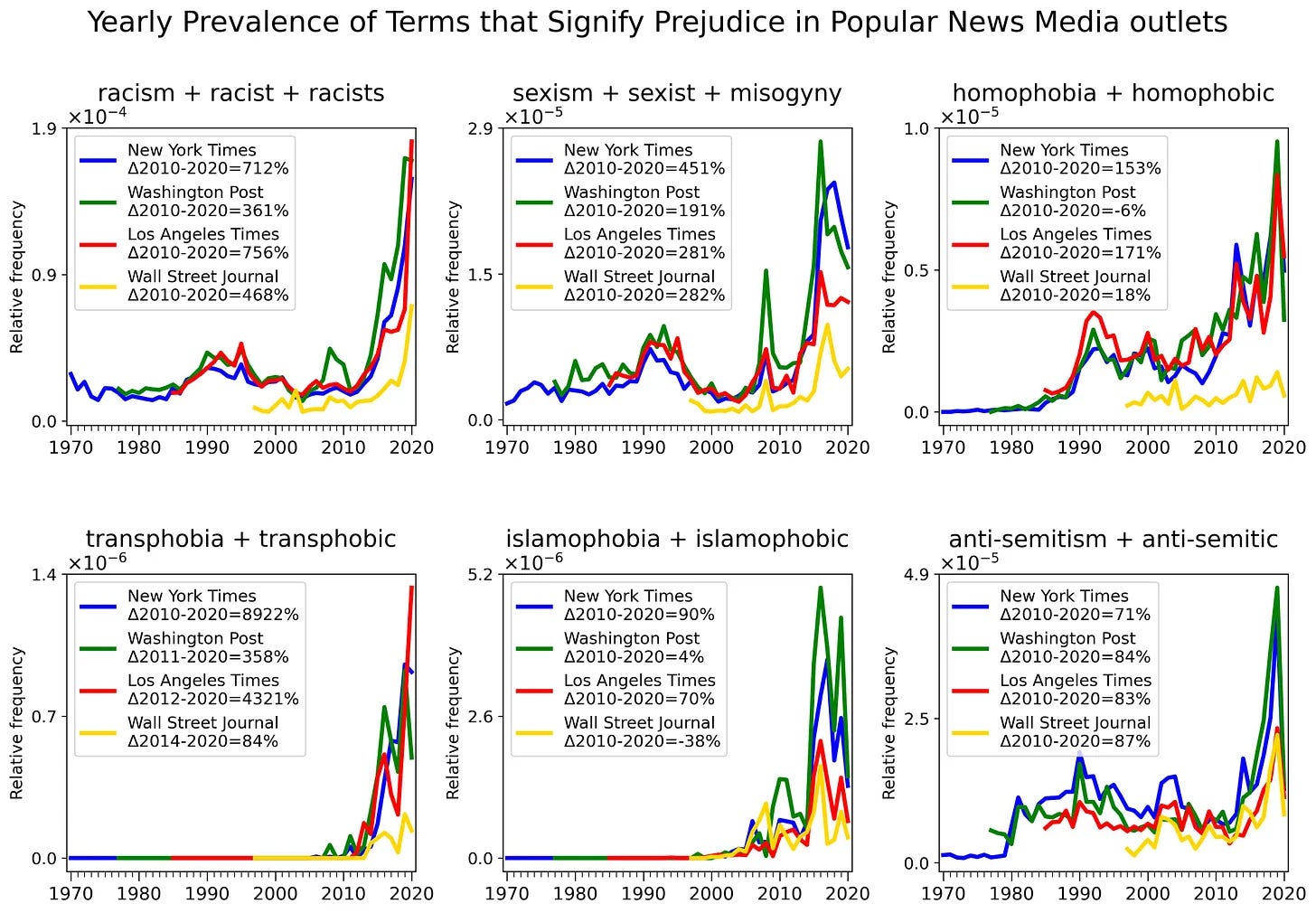Against "phobia"
The dual meaning of phobia and its discontents
There's two uses of this common word:
Fear or anxiety of something.
Dislike of some group, usually left-wing aligned.
The first is the original as it is just the Greek meaning. Here's the most common phobias in the UK:
Phobias are interesting from an evolutionary perspective because they track ancient dangers, not modern ones. Snakes and spiders are high on the list, but Brits do not die or get injured from snakes or spiders basically ever. That's not because phobias are saving them from death but because these threats don't exist in Britain. Heights and flying are interesting because falls are indeed a major cause of death. Enclosed spaces (like an elevator) seem to have some potential evolutionary relevance. Dogs are somewhat dangerous and have been with humans for 10,000's of years, yet rank the lowest. This is perhaps a trade-off with their utility.
The origin of the use of phobia to mean dislike for some group is more recent, and somewhat odd. Many groups that are disliked are not groups that people walk around with a fear of. So why the connection? Here looking at the origin of homophobia is informative. Wikipedia:
Coined by George Weinberg, a psychologist, in the 1960s,[14] the term homophobia is a blend of (1) the word homosexual, itself a mix of neo-classical morphemes, and (2) phobia from the Greek φόβος, phóbos, meaning "fear", "morbid fear" or "aversion".[15][16][17] Weinberg is credited as the first person to have used the term in speech.[13] The word homophobia first appeared in print in an article written for the 23 May 1969 edition of the American pornographic magazine Screw, in which the word was used to refer to heterosexual men's fear that others might think they are gay.[13]
So that use was not originally meant to be aversion to homosexuals, but fear that one might oneself be a homosexual. This fits into the narrative of closeted homosexuals, who become anti-gay activists as a sort of defense mechanism or overreaction. Eventually, the use broadened to mean just dislike of homosexuals, and then broadened to other target groups. Since the people who were interested in reducing 'stigma' towards various groups were mainly left-wing activists, they started coming up with other phobias in this political or social psychological sense (which is about the same given the ideology of the field) and that's how we got xenophobia (strangers/foreigners), transphobia, islamophobia (Muslims), and so on. These words don't relate to secret fears that one might actually be a Muslim without knowing it. This usage also relates to the use of medical-sounding terms to pathologize political enemies, as e.g. in the works of Adorno. The point of this was to explain and prevent the rise of fascism and the causes of the Holocaust. Unsurprisingly, most of these scholars were Jewish. The goal was proving that people with right-wing authoritarian attitudes (as defined by them) were mentally unsound in various ways.
Given the vibe shift in American society, it is perhaps time to do something about this bias in language. There are various other affixes one could use instead, the most obvious being anti-, as in antisemitism. Wikipedia gives some alternatives for homophobia, like the amusing homonegativity.
From a practical perspective, it may be difficult to undo this linguistic trick given the prevalence of the words at this point. The words were heavily promoted by Woke media in recent years:
And also in books in American English:
Perhaps a better option would be to equalize the game. British philosopher Roger Scruton tried this approach by appropriating a counterattack word oikophobia, originally meaning fear of household but broadened to mean dislike of one's own culture, nation, and people. An alternative is europhobia, or the more obvious, anti-Europeanism. The trouble with any word composed with european is that this relates both to a people (European ancestry) and to geography (a quasi-continent). Since a large number of people of European descent now live outside of Europe (USA, Canada, Australia, New Zealand, South Africa), any use of that word is ambiguous whether the people or the geographical area (and its political units) is meant. Many Americans have dislike of Europeans in the geographical sense due to their feelings about wealth superiority ("Europoors") and could be said to be anti-European, in the sense of disliking polities with high taxes, poor economic growth, and bad immigration. There doesn't appear to be a nice alternative word that solves this ambiguity issue. In the past occidental (western) was used. However, this word is also used by European identitarians like the magazine The Occidental Observer (Kevin MacDonald). Other potential counterattack words don't seem to be used, say, conservophobia, though one can find them mentioned in slang dictionaries.





I believe xenophobia predated the new phobias by many decades, and was long understood to be more about fear than hatred.
I do find the new meaning of 'phobia' very annoying. As I recall, the new usage of 'homophobia' was somewhat purposeful, intended to denigrate dislike of homosexuality by associating it with fear, which was promptly associated with ignorance.
Corruption of the language is very useful to those who advocate for crazy things, such as transsexualism. So I doubt the stupid/dishonest words and phrases will ever disappear; the best I can do is simply dismiss them all as nonsense and move on.
Many contemporary uses of "-phobia" would be more accurately served by "-misia", hatred. If we were still educated.